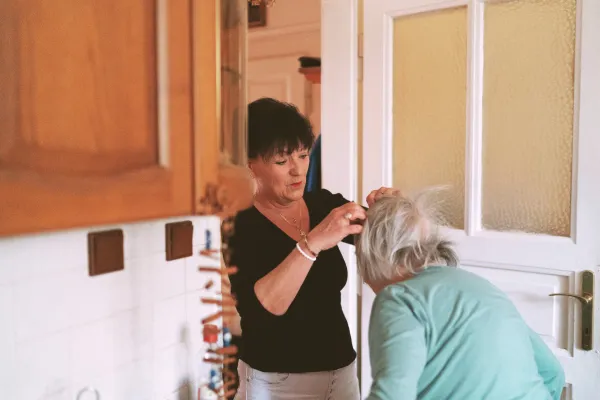
From Rehab to Reality: Why Dementia Care Feels Impossible at Home
For many caregivers, the moment their loved one is discharged from rehab isn’t the end of the crisis — it’s the beginning of chaos.
If you've ever brought a loved one home from rehab and thought, "Why does this feel harder than before?"—you're not imagining things.
Let me tell you about Carl.
His wife, Jean, had moderate dementia. She fell and broke her hip. After a brief hospital stay and two weeks in rehab, she was discharged home.
Carl received a packet of papers, a list of medications, and a vague recommendation that “she may need more supervision.”
Within 72 hours, he was completely overwhelmed.
Jean was in pain, confused, and now non-weight-bearing. Carl had to help with every transfer, manage five new medications, coordinate a follow-up visit with the orthopedic surgeon, and figure out what to do when she tried to stand up without warning.
He hadn’t slept. The home health nurse hadn’t arrived. Nothing he tried was working.
And no one had prepared him for any of it.
Why Rehab Doesn't Prepare You for Real Dementia Care
Discharge planning is built around physical recovery — not cognitive changes, behavioral shifts, or caregiver burnout. It may include instructions for wound care, mobility aids, or therapy exercises. But it rarely includes:
How to manage sundowning in a new environment
What to do if confusion escalates with pain
How to re-establish routines that don’t overwhelm the caregiver
Emotional support for either party
So families go home thinking they’re supposed to “just follow the plan.”
But they don’t have a plan. They have papers.
And when the first issue arises, they’re in reactive mode: something happens → they scramble → it escalates → they feel like they did something wrong.
The Real Problem Isn't the Behavior. It's the Lack of a Plan
The most common mistake I see is assuming that “support” and “a plan” are the same thing.
They’re not.
Support is nice, but without a framework to apply it to, it’s just noise. Caregivers need systems—especially when behaviors change fast and unpredictably.
What most caregivers need in the first week home is:
A flexible daily rhythm that considers pain, sleep, and cognition
Clear instructions on who’s doing what (providers, family, etc.)
Tools to decode behaviors, instead of guessing what’s going wrong
A backup plan for when they’re sleep-deprived and overwhelmed at 2 a.m.
That’s how you begin to close the gap between the handoff and the real work of dementia care.
You Weren't Unprepared. You Were Unsupported
The truth is: the system wasn't built for families.
And until someone helps you build a care structure that fits your actual life, you’ll always feel like you’re trying to plug holes in a sinking ship.
But you don’t have to stay in survival mode.
You Can't Close the Gap Alone - But You Don't Have To
If this story hit home, you're not alone and do not have to stay stuck.
This is exactly why I created the Dementia Caregivers Academy Membership to give families like yours the structure and support they never received, and to help you build a plan that evolves with the disease, not against it.
Every month, we walk through new real-world situations just like this.
You get practical tools, compassionate guidance, and a clear framework to apply it all.
Click here to join now and finally feel supported by someone who gets it.
FAQ
Q: My loved one came home from rehab and is more confused than ever. Is that normal?
Yes — changes in environment, pain, medications, and sleep can all impact behavior. These are often overlooked during discharge.
Q: What should I do first when they come home?
Establish a predictable routine and use a simple checklist to flag pain, confusion, medication effects, or unmet needs. Download the tool above to help guide this.
I’m here sharing for you, while you are caring for them.
—Laura
PS. You can also watch this video on YouTube:
🎥 Watch it now

🫂 Join the Conversation:
Need a community where you can ask for help and get real support?
Join my FREE Caregiver Support Group here
👉 Dementia Caregivers Success & Support Network.
📚 Resources to Support You:
Grab your Medical Assistance Planner and get organized.
The Caregiver Gap Report — a free guide that breaks down what no one told you, and how to get the support you actually need.
👉 Download The Caregiver Gap Report right nowExplore the Dementia Caregivers Academy Course for in-depth strategies and support.
Check out our other free Resources here.
